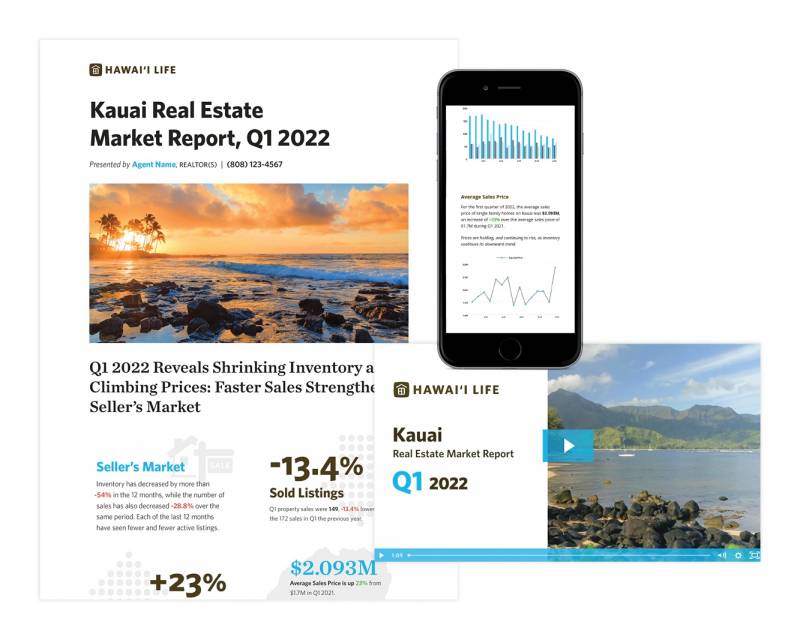Will the Fed Rate Hikes Impact Real Estate Sales on the North Shore of Kauai?

Will the Fed Rate Hikes Impact Real Estate Sales on the North Shore of Kauai?
The financial markets plummeted today, giving back all the gains in recent months, with the Nasdaq falling 5% and the Dow Jones Industrial Average falling over a 1000 points, as investors priced in the hawkish Fed response to inflation through regular rate hikes in coming months. The Federal Reserve uses interest rates as guardrails to inflation and consumer spending, and with runaway inflation, they aggressively combat rising consumer prices with interest rate hikes.
When money is cheap, consumers buy more discretionary items, such as cars, jewelry, vacations and home improvements. As the world economy addresses supply chain issues broken by Covid, price pressure compounded nearly all products — affected by scarcity of materials, manufacturing and shipping lines. The Fed uses interest rates like marionette strings to curtail or motivate consumer spending, including real estate.
In recent years, interest rates went into a negative territory for the first time in American history, in response to the global economic collapse caused by Covid. As rates have grown since, while remaining historically very low, the blazing hot real estate market nationally has seen a slowdown. Mortgages being more expensive have caused this slowdown in part, but uniquely the lack of trading is also the result of a critical shortage of supply, not a lack of demand.
Investors become nervous in an inverted yield curve rate environment, causing broader volatility. An “inverse yield curve” is the term for an interest rate environment in which short-term interest rates are higher than long-term interest rates. What this means in layperson’s terms is that an investor will receive a higher return on a short-term fixed income investment vehicle such as a CD than they will from long-term fixed-income investments, such as corporate or municipal bonds. Historically, this has been the clarion call for a coming recession. Investors tend to move into more conservative short term fixed income sectors, adding further downward price pressure in equities as they sell off for reallocation. Arguably for the first time, luxury real estate is being broadly seen as a sound asset class, not a discretionary lifestyle purchase. Current economic conditions are so distinctly unique from any time in economic history, many analysts don’t expect that history will be our guide this time around.
What does this all mean for real estate on the North Shore of Kauai?
The short answer is that demand far outweighs supply in the limited inventory on the North Shore of Kauai, and with such finite supply that won’t change in the foreseeable future. Prices continue to rise, inventory is evaporating, and days on the market continue to shrink. It is not uncommon for a property that is listed at a 300% increase over the value from three years ago to sell within hours, in the midst of a broader national real estate slowdown.
Why is this?
During Covid, the North Shore of Kauai experienced an incredible influx of wealth. Those who could afford to live anywhere in the world chose to live Kauai. This astonishing level of wealth infusion into the real estate market showed one simple fact: the wealthiest individuals in the world now have embraced luxury real estate as an asset class, not simply an investment property. While ongoing price appreciation at the pace we’ve witnessed is simply unsustainable, there is no sign of demand weakening.
What does the future hold?
Without the benefit of a crystal ball, an understanding of economic history and current conditions must inform our best estimation of what is to come. While mortgage rates do not affect many of these luxury and ultra-luxury real estate buyers in their decision making, as they aren’t using conventional lending to fund their purchases, they are not immune to market corrections. Assets become harder to liquidate to free up cash, and rates on security-backed loans from wealth management firms, the favored buying tool of the wealthy, rise too. Will this economic headwind bode poorly for real estate sales on the North Shore of Kauai, as our wealthy buyers see their larger diversified portfolio values shrink? Not necessarily. If real estate prices continue to rise, even at a much slower rate, or even just level off, it will still represent a more stable investment than other portions of their investment portfolios. Kauai’s community are fierce stewards of the ecological resources of our island home. This slows growth and also protects the allure of the island, and the property values.
We define the luxury market as homes/condos that are sold for >1M, and the ultra-luxury market begins at >5M, in most models. As we have seen record-shattering sale one after another, with private residences selling for 10, 20, 30, 40, 50 and even 70 million dollars statewide in the past two years, the prices of all the inventory on the North Shore is pulled up by the age-old formula of supply & demand.
What’s the bottom line?
For the first time in recent memory, there are individuals who cannot purchase what they want in ultra-luxury real estate, no matter how much money they have. With such finite supply, a fundamental change in how we work, run companies and live remotely, the competition for these properties has only gotten more brutal.
If you are a buyer, we must prepare you to make strong and decisive offers to secure a property. If you are a seller, ensure you are working with a broker that understands current economic market conditions, and can provide guidance on how to price to sell now, as the greatest risk variable in these uncharted waters is time. The traditional calculus in the real estate industry has been turned on its head, and even some of the most tenured brokers do not have a complex understanding of the broader economic influences on the real estate market, and thus cannot provide guidance to their clients on what to expect or how to respond to this new economic paradigm.
Author: Carrie Jackson, MBA, REALTOR (S), worked as a licensed financial advisor for some of the largest finance firms on Wall Street. Carrie works with Matt Beall, CEO, and is based both in the Hanalei Office and the Hawaii Life Private Offices in Kilauea on Kauai’s North Shore. Having grown up on Kauai, and receiving her education and working in the financial sector on the mainland, she provides a unique understanding of both the nuances of geographic micro-markets on the island, and the larger economic context affecting all of us.


Beth Thoma Robinson, R(B)
May 6, 2022
Whoa. You hit the nail on the head from so many perspectives. And I say that wearing my PhD economist hat. All of this applies to West Side Hawaiʻi Island as well. Great job!
And this makes my role as Director of our Conservation and Legacy Lands program even more interesting as a source of collateral damage: “Not necessarily. If real estate prices continue to rise, even at a much slower rate, or even just level off, it will still represent a more stable investment than other portions of their investment portfolios. Kauai’s community are fierce stewards of the ecological resources of our island home. This slows growth and also protects the allure of the island, and the property values.”
Carrie Jackson
May 6, 2022
> Thanks Beth! I’m so grateful to have such a deep bench of intellectual capacity and passion for stewardship in your role as our Director of our Conservation & Legacy Lands program statewide. To your point, I see clearly the collateral damage of the current market, while we are in a unique position to ensure ethical and forward thinking representation of both buyers and sellers in Hawaii. I would also argue that large private landowners are a much smaller carbon footprint/ecological strain than that same land being carved up into neighborhoods, though this becomes a complex question about affordable housing for our local community. There are so many important layers to this conversation, and I so appreciate the nuance in your research and work in this space. Our ecosystem is so fragile, and to have a dedicated focus in your work, informing our representation of open and conservation lands is invaluable.